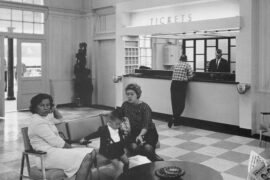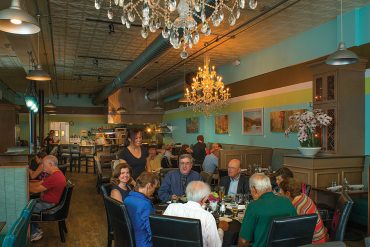The Huntington Quarterly celebrates 25 years as the city’s namesake magazine.
By Katherine Pyles
HQ 87 | AUTUMN 2014
Jack Houvouras was 24 years old when he approached local leaders with the idea to start a magazine for the city of Huntington.
“I didn’t have a grand plan in the beginning,” Houvouras says. “I just wanted to do something creative and positive for Huntington. I had spent some time in other parts of the country, and I thought, ‘Huntington is a lot better than most people realize.’ I just wanted to make people feel good about living in Huntington.”
Armed with a love for writing and experience as the editor of Marshall University’s student newspaper The Parthenon, Houvouras sought the advice of area businessmen as he began to explore the possibility of starting a magazine focusing on Huntington.

“I met with Marshall Reynolds, and he told me a monthly magazine would never fly, so I decided to scale my plans back and publish it quarterly,” Houvouras recalls. “I remember standing at his printing plant when the first issue of the Huntington Quarterly came off the press. He shook my hand and said, ‘Congratulations on making your dream come true.’ That was really special to me.”
Houvouras also shared his idea with Mike Perry, who was featured in the premiere issue and would later become one of Houvouras’s most trusted friends and advisers.

“I have to admit, as a businessman, I was underwhelmed,” Perry says. “I wish I could say I instantly recognized the wisdom of what Jack was trying to do, but I didn’t. The magazine was a totally new concept, and I had grave misgivings. But Jack is a marvelous example of having a dream and being willing to work hard to overcome the doubts of others. I always admired the strength of his conviction that what he was wanting to do would be worthwhile.”
Perry wasn’t alone in his doubts about the viability of a magazine succeeding in such a small city. Numerous business leaders in the community predicted the magazine would fail within a year. Undeterred by naysayers, Houvouras forged onward. He established a board of advisers that included his father, Andrew Houvouras, and began calling local businesses to sell advertising space. His brother, Tom Houvouras, offered him a desk in the corner of his office.
“I had a desk, a phone, a file cabinet and a used Macintosh SE with a 9-inch screen,” says Houvouras, who credits the Macintosh computer for revolutionizing the publishing industry and making the Huntington Quarterly possible. “I just started making calls. I was surprised that nine out of 10 people I asked for an ad took one. I gave them a little presentation of what I wanted to do – be a positive voice for Huntington with a magazine that was slick and full color throughout – and hardly any of them told me no.”
After the advertisers came the subscribers, and then came the premier issue, published in the fall of 1989. Over the years, HQ has profiled community leaders – Marshall Reynolds, Bill Campbell and Joan C. Edwards, to name a few – as well as former residents who have made it big, from celebrity chef Katie Lee to Broadway stars Mark McVey and Michael Cerveris to legendary comedian Soupy Sales. It has showcased the city’s most beautiful homes and interesting architecture, and it has traveled deep into the city’s archives to shed new light on Huntington’s rich past. From local charities to Marshall University sports, the Huntington Quarterly celebrates all that Huntington has to offer.
“The Huntington Quarterly somehow captures the essence of Huntington in every issue,” says Mayor Steve Williams. “It even goes beyond the subject matter to the authors themselves – the people of Huntington write the articles – and to the entrepreneurial spirit with which the magazine was created. Jack and his staff have truly captured the heart of our community with this magazine.”
“It was very insightful of Jack to start publishing such a wonderful magazine back when we needed it the most,” notes retail tycoon Verna Gibson. “Downtown had deteriorated from the upstanding area that I remembered, but Huntington was still a wonderful place with a lot of wonderful people. I think the Huntington Quarterly provided leadership in instilling renewed pride in our community.”
“Jack has been able to constantly and steadfastly come up with new ideas and interesting articles,” Perry acknowledges. “I don’t think many people could have envisioned that much interesting material, but the creativity and the resourcefulness and the ingenuity of the Huntington Quarterly staff are remarkable.”
One of the magazine’s most popular sections is the “Yesterday” feature, usually written by retired newspaperman James E. Casto. The in-depth historical articles often evoke personal memories for readers, such as walking to Frostop Drive-In on a summer day, cheering on the legendary 1971-72 men’s basketball team at Marshall or climbing aboard a passenger train at the old C&O depot.
Readers are inspired not only to reflect on their past but also to build a better future, thanks to frequent articles about local men and women who have achieved incredible success.
“I especially enjoyed the Summer 2010 cover story on Bill Campbell,” Perry says. “Mr. Campbell was an individual I greatly admired and respected. He taught me many years ago that the principles of golf and the principles of life are much the same, and Jack captured that in his excellent article. The Huntington Quarterly provides us role models to read and study about, and hopefully young people are inspired by them to pursue their own dreams and make a difference in the future of our wonderful community.”
For Mayor Williams, an article in the Winter 2013 edition of HQ provided cherished memories all its own.
“The Huntington Quarterly published a small article when I was elected mayor,” he recalls. “My dad had dementia, and I don’t know if he even knew I had been elected. But he looked at that article, pointed to me and pointed back to my photo in the magazine. He had a huge smile on his face.”
Houvouras says HQ’s “Best of Huntington” lists, which have ranged from the best-dressed residents to the city’s best ice cream, are enjoyed by staff and readers alike.
“Our ‘Top 10’ and ‘Top 20’ lists always spark a little bit of controversy,” he says. In the Spring 2013 edition, HQ was careful not to name the city’s best hot dog, instead leaving it up to the reader to decide. “If there’s one thing I’ve learned publishing a magazine in Huntington for 25 years, it’s that hot dog supremacy is in the eye of the beholder.”
Of course, not all of Huntington Quarterly’s ideas were sweeping successes.
“We put Sen. Robert Byrd, Sen. Jay Rockefeller and Rep. Nick Rahall on the cover of our fourth issue – worst-selling issue of all time,” Houvouras laughs.
Houvouras says one of the perks of being the boss is choosing which articles to write himself, recalling the cover stories on Bill Campbell, Gen. Chuck Yeager and Dr. Paul Ambrose as his favorites. Although his editing and publishing responsibilities have increased over the years – with the addition of custom publishing contracts for Marshall University, Cabell Huntington Hospital, the Marshall University Joan C. Edwards School of Medicine, The West Virginia State Bar and The Virginia Bar Association – Houvouras continues to write.
“As proud as I am of the business success that we’ve had, I’m a writer at heart,” he says. “When a story appeals to me, I really dive into it. Nothing is more satisfying than writing something that I think is good – or that a handful of people I respect think is good. In the end, it’s not about whether you achieved as much financial success as you wanted. It’s about whether you used the talent you were given.”
As readers know, the talent at the Huntington Quarterly doesn’t end with Houvouras. Two full-time graphic designers, a full-time managing editor, a full-time advertising manager and a slate of gifted freelance writers and photographers contribute to every issue.
“Our full-time staff members, mostly products of Marshall University, work extremely well together,” Houvouras says. “Marshall’s journalism and graphic arts programs have supplied us with a lot of talent over the years. We’ve also been fortunate to track down some very talented writers and photographers who do great work. They make us look good.”
And when the Huntington Quarterly looks good, so does Huntington. Throughout these 25 years, Houvouras’s original goal has remained the same: Show the positive side of our community.
“You can find negative stuff anywhere you look – newspapers, magazines, TV, websites, anywhere,” says Huntington resident and former NFL star Troy Brown.
“That’s why it’s important to have a magazine that focuses on the positives. I think a lot of other cities could benefit from a magazine like the Huntington Quarterly, and I’m glad we have it here.”
Thomas McChesney, director of marketing and business development for Huddleston Bolen and a dedicated community volunteer, says the Huntington Quarterly has artfully bridged the gap between Huntington’s past and its future.
“For so long, we wallowed in how bad things had become and longed for the ‘good old days,’” McChesney says. “The Huntington Quarterly is important because it embraces both who we were and what we are becoming. It celebrates our history but also celebrates the people and places that are building a future for our city. In doing this, HQ is an active participant in creating what will soon be a truly exceptional place to live.”

Huntington has changed tremendously in the 25 years since HQ’s premier issue, with the construction of Pullman Square, the expansion of Marshall University and the rapid growth of Huntington’s two regional hospitals, Cabell Huntington Hospital and St. Mary’s Medical Center. The magazine industry has changed as well.
“I remember thinking, ‘It would be so cool if what you saw on the computer screen could look exactly like what prints out on paper,’” Houvouras recalls. “Of course that happened over time. But even with the changes in technology and all the new online media, people are as loyal to magazines as they’ve ever been. When you look at all the different ways you can read news, research shows magazines are the most trusted.”
Extremely loyal readers are one of the many reasons why advertisers remain so faithful to the Huntington Quarterly. According to Houvouras, the main reason businesses advertise is simple: “It works.”
“If you want to showcase your business or product, our magazine offers a full-color, high-quality way to do that,” he says. “Our advertisers know how much readers love getting the magazine. People read it cover to cover – including the ads.”
Flipping through the pages of old issues, Houvouras is reminded of why he loves his job.
“Looking at our back issues is really nostalgic for me,” he says. “I have learned so much about our city and have met so many people I would never have known otherwise. I wrote about Mike Perry, and we became lifelong friends. I wrote about one of my personal heroes, Chuck Yeager, and he actually sat down to write a letter to me. I traveled to New York to hear Mark McVey perform, and I was on the edge of my seat for three straight hours. I wrote about Bill Campbell and golfed with him at one of the most renowned courses in America. Every once in a while I’ll look back on a story and cringe, but most of the time I’m able to say, ‘This is one I’m really proud of.’”
According to fans of the magazine, Houvouras has much to celebrate.
“Jack is a successful small business owner, which is no small feat,” McChesney says. “Over the past 25 years, he has certainly faced many challenges. With the changing media landscape, many publishers reduced the quality of their publications. Many others have simply failed. But throughout it all, Jack has maintained very high standards and produced high-quality, well-written magazines that people want to read.”
“In order to last, you have to be creative and you have to be interesting,” Gibson says. “The Huntington Quarterly is both of those things. It is beautifully done. It is first class.”
“When I started the magazine, people told me it wouldn’t last a year,” Houvouras recalls. “After one year, they said it wouldn’t last two, then five, then 10. It’s 25 years old now – and I think people are happy it’s still around. Everyone needs motivation sometimes, and there’s nothing better than someone telling you that you can’t do something.”
And as for Perry, he is thankful Houvouras ignored his own initial skepticism.
“When you’re wrong, it’s important to acknowledge it and move on,” Perry says. “I’m very glad to say I was wrong about the Huntington Quarterly.”





